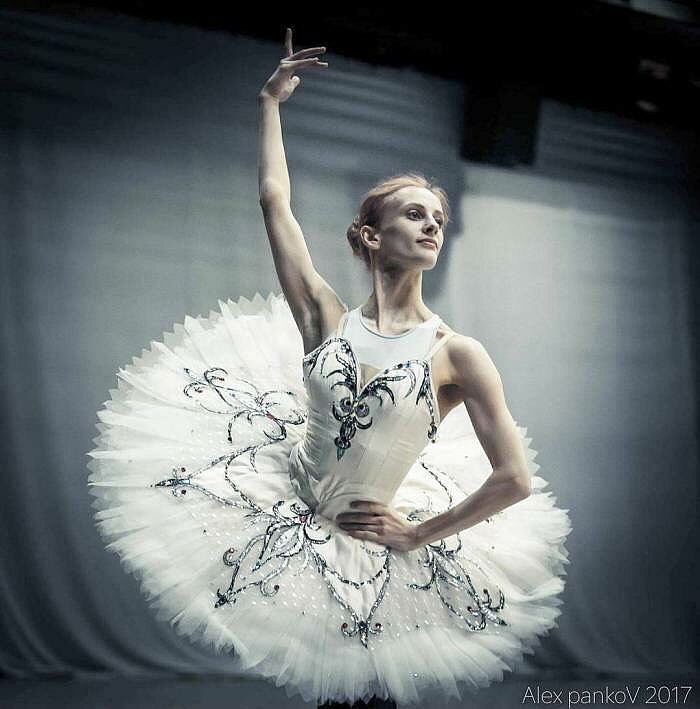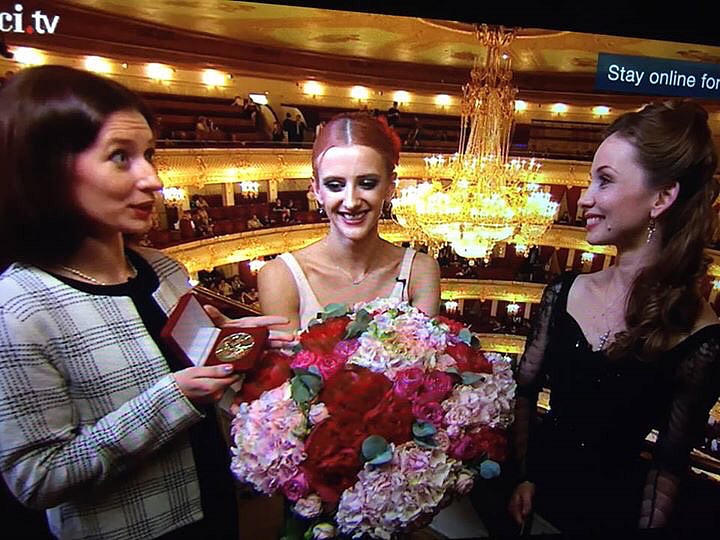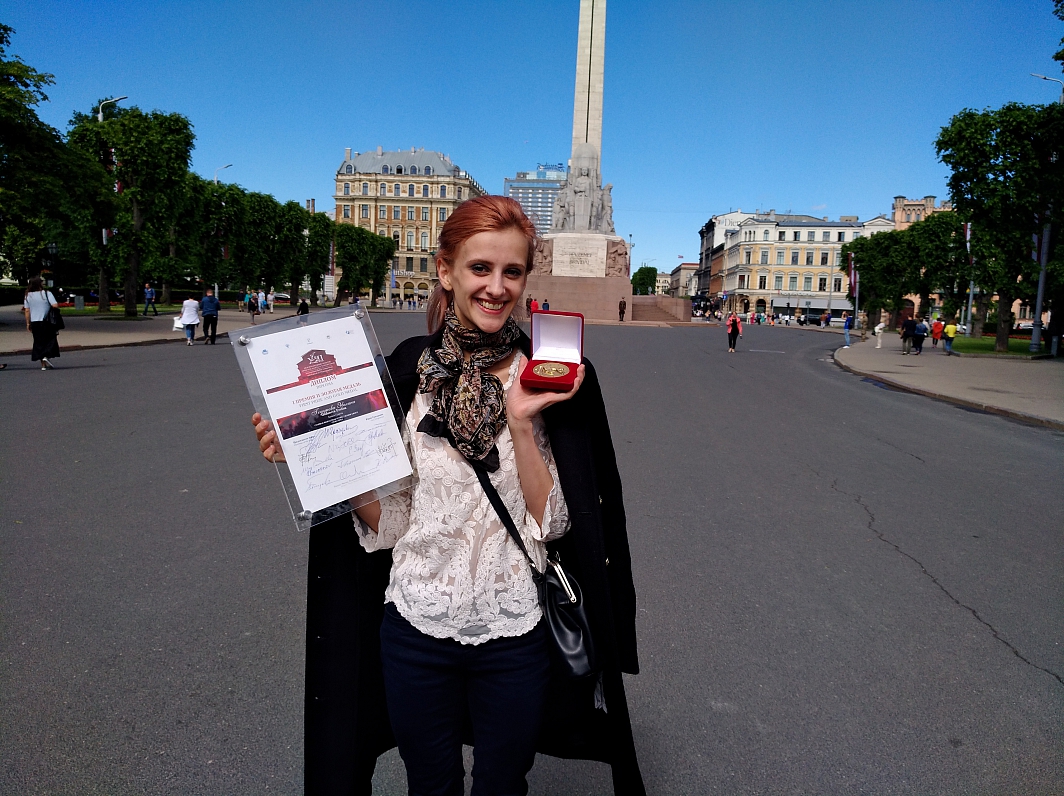Context
The International Competition of Ballet and Choreography in Moscow is one of the most prestigious in the ballet world. Since 1973 the jury is chaired by the legendary choreographer Yury Grigorovich. Dancers from Latvia have won awards just three times - in 1969 Riga-born Mikhail Baryshnikov won first place in the adult competition, while in 2013 Timofej Andriyashenko (currently a soloist at La Scala) won the youth competition. Evelina Godunova is the first Latvian ballerina to win the award. She was awarded first place in the female adult competition.
- For how long will you be staying here, Evelina?
- For two weeks. I was away from my native country for a year. I missed it terribly of course. What I'll do first is meet my relatives. I've missed my mother and father, my brothers a lot.
Now I know how difficult it is to do without without your family. It's difficult to live without your relatives abroad, even if you have your own life there. You still long for your home and your relatives.
You even crave for the food you are used to, the mentality, jokes with your friends. You're far away and still your heart wants to be home. Home is where your mother is, and that's why Riga is my home.
But I was away for a year as it so happened that I decided to perform for the second season in Seoul, in Universal Ballet, and I stayed there. Generally speaking, events transpired so that I stayed in South Korea where it was work, work, and then some more work.
- What roles did you perform?
- I danced as Kitri in Don Quixote, Clara in the Nutcracker in Vainonen's production. That is, it's good there, they're giving you roles and everything's alright there.

- I remember the Latvian ballet soloist Erlends Ziemiņš. He wasn't even a laureate at the 1989 competition in Moscow but he was enlisted by impresarios and now he's living happily in the US. While Timofei Andriyashenko became the leading soloist at La Scala almost immediately after his victory. You must have been receiving offers after your resounding victory. Could you tell more about your creative plans?
- There have been some suggestions, quite a few of them at that. But... I won't be revealing anything yet.
- Of course. But did you count on your victory?
- I'm happy that I decided to go to the contest after all, but I did not think I'd make it even into the second round. You could say I went as a tourist. Did I think I'd emerge victorious? Many were surprised after the fact, saying, how come? [...]
During the amazing "golden hour" before winners were announced... You know, I had a feeling I'll get the gold. And when it happened I felt that wonders do happen.
When they named me the winner, I understood that I believe in magic, in wonders, in the fact that things happen for a reason. And I only have to pray it will get even better!
- What's your take on why the outstanding jury chose you? Was it the combination of Latvian- and Russian-school of ballet mixed with Korean technique? The Chinese and Koreans have long been praised for their technique but perhaps they lacked what your style has?
- It's all quite specific. Yes, it's a Latvian, Russian and Korean style. I got my fundamentals at the Riga Choreography Institute from Rita Harlapa. I was incredibly lucky to get my fundamentals here, my leg, arm and mind fundamentals; fundamentals in my thinking, in understanding music and rhythm. Afterwards I worked for five years at the Latvian National Opera in a ballet troupe. It gave me practice on the stage, daily performances... It gave me character, a moral tenacity as there were many mishaps and all sorts of things during these five years.
And South Korea. The troupe of South Korea is a brilliant place where I had the pleasure to be. The collective, the mentality, and the teachers are more than just professional. The troupe are working with the leading teachers from the Mariinsky Theatre. They're paying huge sums of money. In the end South Korea is chasing the unique skills from the Mariinsky and the Bolshoi. And at that there's the Korean mentality that knows how to put things into order. A Korean pupil will remember everything, will write down everything and won't forget a single character from what the teacher says.
Furthermore they pay due attention to mistakes. They make you remember that there are always some and that you must always correct them. And within twenty years they've made such wonderful ballet in Korea... it has grown immensely during the decades! It has become better in many respects than the Mariinsky and Bolshoi are now.
They've found a formula for success - they did not have any ballet but now they do thanks to Russian teachers. They made a mature ballerina out of me. They corrected a few things - the legs, the arms, the turns of the head, and where I stand on the stage and how. I couldn't have received such nuanced schooling anywhere but there.

- I saw a photo in which a visibly delighted jury member Vladimir Malakhov - a star of the ballet world - was hugging you. Did the jury members - Grigorovich, Zakharova, Tsiskaridze - tell you anything behind the scenes? Did they tell you why it was you who was awarded the golden medal?
- You know, I don't like to put on airs, but... I don't remember any specifics from the contest besides Malakhov and Zakharova saying, "Hang in there!" after they walked up to me. They supported me. Moscow greeted me very well from day one since I stepped off the plane. Everyone helped me. They carried my belongings, picked me up and dropped me off...
And when I walked on the stage of the Bolshoi to dance a variation of Kitri during the third round, the viewers broke into applause and I burst into tears right there. You know, I'm on the stage of Bolshoi and there's the jury in front of me... and not just any jury but one headed by the great Grigorovich. I could see him.
And then Zakharova, Tsiskaridze, the genius Swedish ballet director, the head of the Danish ballet... they were all there! And they applauded to me. God, it was so delightful!
- Andris Liepa shared a video from this variation from medici tv on Facebook...
- He wrote to me afterwards... After the first time I got on the stage many people told me that I'm well ahead of everyone else.
- Then there's a thing... Did your name play a role at the contest? That is, behind the scenes? Keeping in mind the relationship between Yuriy Grigorovich and Riga-born grand Aleksandrs Godunovs and their tragic estrangement in the US in 1979?
- Well, if we are talk on terms like these, my energy was what played the greatest role. The first thing I was told that I have an insane leap, a learned technique, that I'm flying on the stage.
Jury member Toomas Edur came to me, hugged me and looked up, saying, "I can't catch you, as you're flying all the time!" The energy was there not because of my name but the connection to the jury. Afterwards we laughed when I said that as I went on the stage the first thing I saw was Zakharova smiling my way. I was turning and thinking, God, I have to watch my pirouettes but here is Zakharova smiling at me.
Basically the jury liked me. They saw talent, I suppose. And that I love the stage. I am only free on the stage. I did not have to bother too much, I was just myself.
But I worked a great deal. I worked a crazy great deal. When everyone else was resting I was at work. Everyone was sleeping and I was at work. Everyone was waking up but I was still thinking about work.
I was doing drills for days. And then there's the thing I won't ever know, the thing people see on the outside.... It's charisma or some sort of energy, I suppose.
- Was it the first time you were on the great stage of the Bolshoi?
- Yes. And it just so happened it was my birthday! Like a gift from up above! It was the finals and I was dancing Kitri from the first section and the variation of Paquita. And there was such energy from the stage and the hall. I can't put it into words, I can't tell it in any interview. I will be telling my grandchildren how I ran off the stage bowing down as I simply burst into tears. It was so nice... But 'nice' isn't the right word.
Standing on the most important stage of the world is something you dance and live for. I think that the Bolshoi, despite everything, is still one of the main theaters of the world. No matter how you put it.
And when the public accepts you on such a degree! I couldn't have seen it in my most audacious dreams.
- Is the stage of the Bolshoi twice as large as in our Opera?
- It's just very big... but you can leap across it. That is, I have proven to myself that you can leap across the stage.

- In addition to the golden medal you were awarded a special prize 'for following the traditions of classical ballet'. What is it awarded for?
- I could not take it with me. Here's the diploma. And the earrings. When I was told how much they cost I almost turned white. That is, my life is assured! I can stop working now! (Laughs.)
They asked me in Moscow what exactly following the traditions of classical ballet means. I answered that there's Marius Petipa.
Sadly many things are turning into a circus nowadays. All the dancers are trying to jump higher than anyone else. I am jumping higher not because I want to do so but because I was kissed by God, as I feel it.
But now everyone's trying to jump over their heads. Why? Or they try making 34 fouette turns - no matter in what condition and no matter how it looks, they only want it so there are 34.
Ballet is art not sports. First of all ballet is the idea of bringing something to the audience. The audience, when they're going to the theater, they have to feel some inspiration, some spirituality. It's like going to church.
The audience has to leave the hall feeling pure and ennobled. Because life is hard enough as it is. Many situations arise each day, good and bad. People tire of life. Living is hard work.
But you come to the theater to feel the art and let everything go and feel alive and real. Or you come to the theater to ask yourself whether the way you live is right. Whether everything is going on as it should.
Now everything in ballet is moving towards the contemporary. Contemporary isn't always pleasant. It often asks tricky questions, and that is, of course, valuable. There is not much good contemporary ballet, in which you see the language of the choreographer, the plasticity. The audience just look: oh, what beautiful legs, but there's no point behind it.
A choreography contest took place concurrently in Moscow, and many were upset that there are no choreographers with their own language, like Jiří Kylián.
Basically they have given them space but the new generation of choreographers has not matured yet, a generation with a different outlook on life.
- I'm reminded of Mats Ek's choreography here, when Ana Laguna was tossing about the stage and Mikhail Baryshnikov just went past her, gave her a look and vanished. It lasted a mere eight seconds and it was stunning.
- Yes, that's what I'm talking about. You don't have to move around a lot - it's the idea that's important, and the performer of course.
- Please describe the time Mikhail Baryshnikov came to see Romeo and Juliet when you were performing in Riga.
- I had no idea he'd come. I started performing with the first run, then I went behind the scenes before the first, the most difficult variation in this ballet - it's fatal and it's very worrying because you have to do everything right.
And just before this variation someone comes up to me and says, "HE is watching." [..]
- I remember a peculiar case when I was passing by the Opera house two years ago. All of the sudden a shower started pouring as if from a bucket! We hid from the rain by the central entrance. And then you came from another direction. And lightning suddenly struck a blooming lilac (it was of a special, valuable species at that) at the Opera square and turned it into splinters. I was thinking of you at that moment. Can you take a hit like that?
- I get through difficulty with ease. You asked me at one time, whether it's the good or the bad that becomes etched into my memory. I never remember the bad. When fate strikes me I feel it not as a slap to the face but rather my hinder parts. If nothing bad had happened to me I would not have been able to value the good.
There are people who start complaining when faced with something bad. But where's the use in that? Instead of crying, they should think about what they should do to change.
You have to be able to accept everything. Then you are faced with work with yourself. And you should never close your eyes and shut yourself away. Then everything will go well.
- Many admirers and reputable people tell you on Facebook, "Return to the Bolshoi, but this time don't ever go away!"
- I don't want to talk about this. Everything will turn out as it should. The ballet profession is very peculiar and it has many pitfalls. Besides, one's well-being is also very important.
I am having a moment in which I understand that I have won such an award big enough so that Evgenia Obraztsova (Prima ballerina with the Bolshoi Ballet in Moscow-ed.) would interview me on air!
I couldn't have dreamed about this. It's unbelievable. What's most important is to make the right choice, to be healthy, to work and to keep on doing my thing.




























